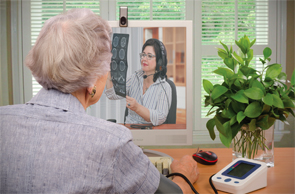“This makes it necessary, especially in first encounters, to have another healthcare provider with the patient to evaluate [them],” says Dr. Lisse.
New technology never comes without expense. The operation of a kiosk typically includes a staff attendant—who may need to be trained and certified—as well as the purchase, maintenance and operation of computer and medical device equipment.
It remains to be seen whether this type of medical delivery model could be successful and cost effective and also address liability concerns. Researchers hope to find some answers from pilot programs, such as those being tested by the Cleveland Clinic and the Mayo Clinic.
The Mayo Clinical Health System is offering the kiosks in collaboration with public schools at a location in Minnesota for school employees who can interact electronically with doctors and other medical professionals at the Mayo Clinic. The program, called Mayo Clinic Health Connection, is expected to improve wellness and reduce waiting time for doctor appointments and missed work for employees, Mayo Clinic Health System CEO Dr. Mark Ciota said in a statement.
“Mayo Clinic Health Connection will help school staff and their dependents avoid waiting for traditional healthcare appointments and time away from work, and still get the continuity of care you need from people you trust,” Dr. Ciota said.
Outside of the medical community, big health insurance companies, such as Anthem, Kaiser Permanente and United Health, have begun pilot projects to test the waters with what amounts to walk-in virtual office visits. Programs are being rolled out to large companies that want to take advantage of technological advances by offering their employees greater options when seeking medical help or filling a prescription.

Rheumatology patients who live in rural areas that are hours away from the nearest rheumatologist may benefit the most from telemedicine.
Image Credit: verbaska/shutterstock.com
A company called American Well offers a similar kiosk model typically used for acute care needs, such as a sore throat, skin rashes and sinus infections, according to company spokesperson, Catherine Anderson. They are most often installed in corporation and retail environments.
“Our large health plan clients often deploy the kiosks with their clients to provide easy healthcare access to their employees,” Ms. Anderson explained in an e-mail. “This improves access, provides great convenience and decreases cost of care and absenteeism from work.”
One visit costs about $50 and is often covered by the customer’s health plan, says Ms. Anderson. For now, American Well does not provide specialty medical care through the kiosk setup, but that could change if the technology takes hold.



